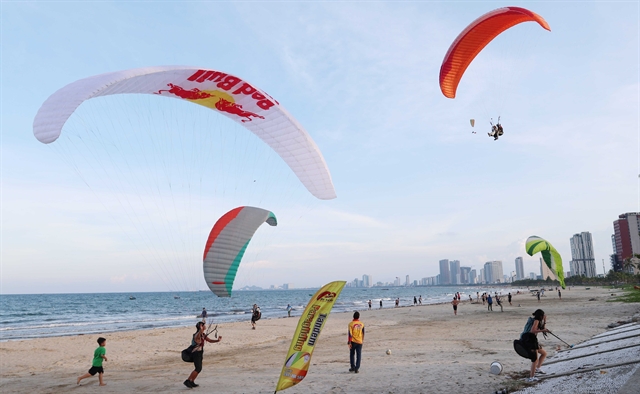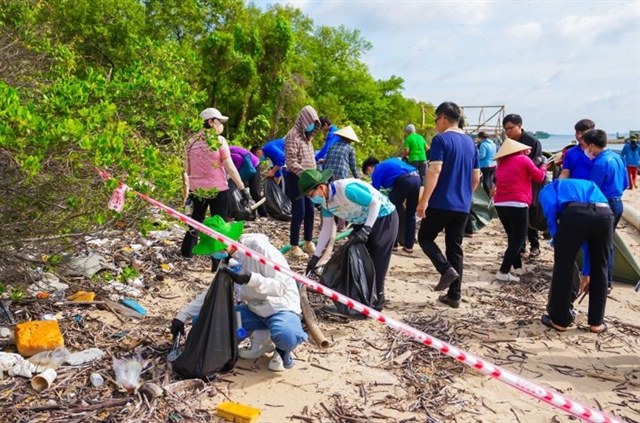 Environment
Environment

 |
| Tourists at a beach in Đà Nẵng City. —VNA/VNS Photo Kha Phạm |
HÀ NỘI — With over 3,260km of coastline from the north to the south, Việt Nam is an attractive destination for both domestic and international tourists. The country’s tourism development strategy to 2030 prioritises the development of coastal and island tourism, including beach resorts, marine sports and entertainment.
Marine tourism accounts for up to 70 per cent of the sector’s total revenue, making it a vital contributor to local and national economic growth. However, rapid growth has brought environmental challenges, prompting coastal provinces to seek sustainable solutions to preserve natural resources for future generations.
Tackling marine pollution for greener tourism
The surge in the number of visitors has exacerbated issues such as plastic waste, coral reef degradation, and ecosystem imbalance.
The Việt Nam Institute for Tourism Development Research (ITDR) warned that plastic waste from tourism activities could triple by 2030, reaching 336,400 tonnes annually.
 |
| Plastic waste scatters along the beach at the foot of Rồng Mountain in Nghệ An Province, June 2025. — VNA/VNS Photo Xuân Tiến |
Projects focused on restoring marine ecosystems have yielded positive results. In Nha Trang Bay, more than 15ha of coral reef have been revived since 2015, while the Cù Lao Chàm Marine Protected Area has safeguarded over 16,000ha through joint efforts between local authorities, fishermen, and non-governmental organisations (NGOs).
Each year, the area welcomes over 200,000 visitors, generating around US$30 million in revenue while preserving its long-term natural value.
Initiatives such as GreenHub’s “Joining Hands for A Blue Sea” have mobilised thousands of volunteers to clean beaches in Đà Nẵng, Quảng Nam and Phú Yên. These efforts have improved public awareness and supported the long-term development of sustainable marine tourism.
Community action and policy support
On June 8, nearly 10,000 volunteers joined the “Act for a Blue Sea” campaign launched by the For Green Future Fund (Vingroup), collecting 72 tonnes of waste along 17 hectares of beaches across 28 coastal provinces.
Organisers said such activities nurture a culture of environmental responsibility and inspire long-term behaviour change.
 |
| Volunteers collect trash along beaches as part ofthe “Act for a Blue Sea” campaign. |
Individuals are also making conscious travel choices by avoiding single-use plastics and preferring eco-friendly tours.
In addition to setting an example by disposing of waste properly and minimising littering, many also encourage their children to take part in beach clean-up activities organised by local authorities or tour operators.
In response, Việt Nam has implemented various policies to combat plastic pollution that results from the tourism industry.
The Ministry of Culture, Sports and Tourism has issued environmental guidelines aimed at eliminating single-use plastics at tourist sites and accommodations by 2025.
Towards sustainable coastal future
Experts emphasised that sustainable marine tourism requires collaboration among the State, businesses, and local communities. There is a strong focus on eco-tourism, the use of green technology in waste management, and enhancing public education.
Vũ Thế Bình, President of the Việt Nam Tourism Association, urged localities and tourism operators to find alternatives to plastic in business activities. He highlighted that marine conservation is not only a responsibility of the tourism industry but a shared duty of individuals and tourists.
Protecting the environment today aims to safeguard precious resources and preserve natural beauty so that future generations have the opportunity to experience Việt Nam's pristine and blue beaches. — VNA/VNS